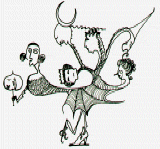Tea
Caddy Index

History of
caddies
Tea and Opium
Request
current list of available tea
caddies.
| |
Penwork Caddy with Quirky Decoration of European and Exotic
Fusion. Circa 1820
Please click on images to enlarge
Reference: TC 108.
Description:
Penwork Caddy with Quirky Decoration of European and Exotic
Fusion. Circa 1820.
Origin: United Kingdom
Circa: 1820.
Materials: Maple
decorated with penwork, gilded brass
Size: It measures 12 inches
wide by 5.2 inches deep and it is 7.3 inches
high: 30.5 cm wide by 13.1 cm
deep by 18.5 cm high.
Condition: Good
overall, Retains its original varnish, working lock with replacement
key.
|

The caddy is of subtle sarcophagus form and stands on
original brass feet. The sides are decorated in bands of flowers, which although
stylized, they also include a naturalistic flowing element. This is
characteristic of the period: neoclassicism was still an integral part of the
decorative tradition, but naturalism was beginning to soften the lines and liven
the rigidity of some of the earlier motifs. It is still a long way from
Victorian over indulgence in sugary prettiness.
|
The interior opens to an original bowl
flanked by lift out canisters also
decorated in penwork.
The sides have the original handles of double
horn-of-plenty, a very strong Regency motif, inspired by ancient wall paintings.
The top is most interesting in that it depicts oriental men
and European women in an exotic landscape. Two of the men appear to be serving
the ladies, one carrying flowers for them and the younger one bringing them a
bird. The third man, who is wearing a wonderful hat is resting and observing.
One of the women is gathering flowers. The scene hints at a very relaxed
relationship between Europeans and Orientals. This is most unusual. On the whole
chinoiserie scenes depicted only Eastern figures. European figures were either
painted in naturalistic English country settings, or very rarely in classical
poses.
The back too has a most wonderful surprise: a very
contended looking Griffin bird, with a hooked beak and eccentrically marked
plumage, gazing at a pineapple-shaped urn. Only a Regency mind could have
conceived of such an artifact!
The lids of the canisters continue the theme of mixed
cultures. A beautifully dressed oriental man is trying to assist a European
woman who appears not to be able to stop her overgrown brat from bawling his
head off.
On the other canister, an oriental child in contentedly playing in the
exotic landscape, rolling a hoop with a stick.

|
The interior opens to an original bowl and canisters also
decorated in penwork.
|
Please click on images to enlarge
There are lots of photos they can be
seen in higher resolution by clicking on them. They can be viewed as a slide
show in higher resolution.

|
The sides are decorated in bands of flowers, which although
stylized, they also include a naturalistic flowing element. This is
characteristic of the period: neoclassicism was still an integral part of the
decorative tradition, but naturalism was beginning to soften the lines and liven
the rigidity of some of the earlier motifs. It is still a long way from
Victorian over indulgence in sugary prettiness.
|
The sides have the original handles of double
horn-of-plenty, a very strong Regency motif, inspired by ancient wall paintings.
|

|
Please click on images to enlarge

|
The sides have the original handles of double
horn-of-plenty, a very strong Regency motif, inspired by ancient wall paintings.
|
Please click on images to enlarge
The back too has a most wonderful surprise: a very
contented looking Griffin bird, with a hooked beak and eccentrically marked
plumage, gazing at a pineapple-shaped urn.

|
Only a Regency mind could have
conceived of such an artifact!
|

|
Detail:
The top is most interesting in that it depicts oriental men
and European women in an exotic landscape.
|
Please click on images to enlarge
Two of the men appear to be serving
the ladies, one carrying flowers for them and the younger one bringing them a
bird. The third man, who is wearing a wonderful hat is resting and observing.
One of the women is gathering flowers. The scene hints at a very relaxed
relationship between Europeans and Orientals. This is most unusual. On the whole
chinoiserie scenes depicted only Eastern figures. European figures were either
painted in naturalistic English country settings, or very rarely in classical
poses.

|
|
Detail:
The third man, who is wearing a wonderful hat is resting and observing.
|

|
Detail of top: young
man in exotic dress bringing them a
bird.
|

|
Please click on images to enlarge

|
Detail:
The back too has a most wonderful surprise: a very
contented looking Griffin bird, with a hooked beak and eccentrically marked
plumage, gazing at a pineapple-shaped urn. Only a Regency mind could have
conceived of such an artifact!
|

|
The lids of the canisters continue the theme of mixed
cultures. A beautifully dressed oriental man is trying to assist a European
woman who appears not to be able to stop her overgrown brat from bawling his
head off.
|

|
Inside the Canisters
retain some of their original leading
|
Please click on images to enlarge

|
The interior opens to an original
deeply cut bowl.
|
Please click on images to enlarge

|
Detail: The sides have the original handles of double
horn-of-plenty, a very strong Regency motif, inspired by ancient wall paintings.
These are made of pressed brass and retain some of their original gilding.
They have patented to a rich glow
|
News
| Buying
| email | Online
History of boxes | The
Schiffer Book
All text and images and linked images are ©
1999-2006 Antigone Clarke and Joseph O'Kelly. If you require any further
information on permitted use, or a licence to republish any material, email us
at copyright@hygra.com
|
